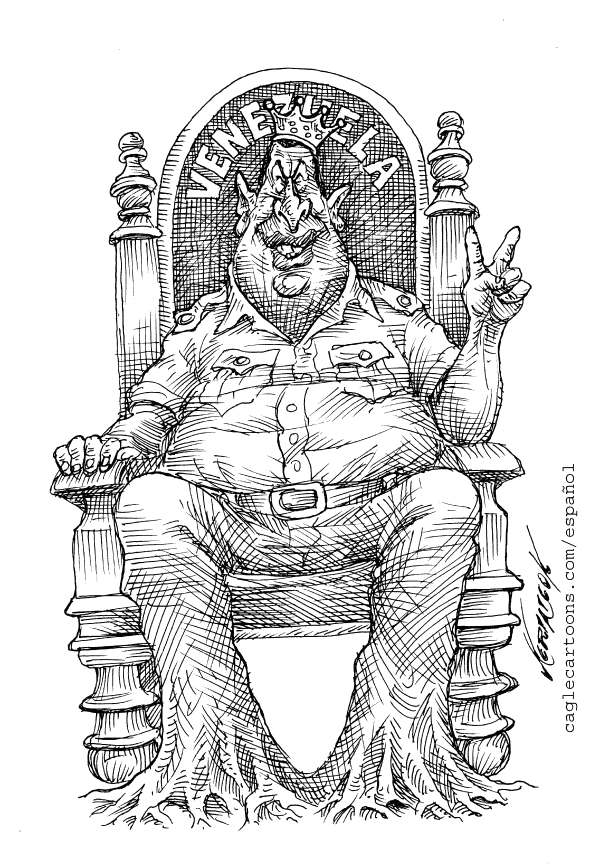 Pablo Kleinman, Editor-in-Chief of Diario de América, a Spanish-language political journal, and President of the Californiana Foundation, a Los Angeles-based think tank, paints a picture of Hugo Chavez’s Venezuela in a way that Chavez would not like to have the world see it in this post on RealClearWorld:
Pablo Kleinman, Editor-in-Chief of Diario de América, a Spanish-language political journal, and President of the Californiana Foundation, a Los Angeles-based think tank, paints a picture of Hugo Chavez’s Venezuela in a way that Chavez would not like to have the world see it in this post on RealClearWorld:
The Caracas Metro is modern and attractive. The trains are practically identical to those of the Washington DC Metro, and the turnstiles, the same as the ones found throughout Madrid’s subway system. But all similarities end there: inside the subway cars, instead of commercial advertisements there are only posters with propaganda for Hugo Chavez’s “socialist” revolution. The stations, although built relatively recently, are pretty run down and almost every escalator I saw there was out of service.
It was Friday morning of last week, and I had taken the subway to the financial district to exchange dollars for local currency in the black market, in which the Venezuelan Bolívar Fuerte is worth about a third of the value arbitrarily set by the government in the “official” market. The value set by the government is 2.15 to the dollar, while in the black market I was able to get 6.30 Bolívares for every dollar I had, effectively tripling my purchasing power.
On my way back to the hotel, I happened to be on the same train as a group of Chavista red shirts, who much like Cuba’s infamous Committees for the Defense of the Revolution, have as their main purpose the intimidation of those who speak out against the government and are opposed to the incipient communist dictatorship that is slowly being established in Venezuela.
He writes about how the government pulled out all stops — just to discredit a small meeting of a think tank.
The furious reaction of Chávez himself and of his cronies to a gathering organized by a small free-market think tank, reflected in the brief detention upon arrival at the airport of a couple of the main speakers, in the hundreds of hours devoted by the government-run radio and television to condemning the event and in the constant harassment by the red shirts, highlighted the fact that in Venezuela there is very little freedom of expression left and that the Chávez regime, despite having gotten to power originally through a democratic process, no longer exhibits any democratic characteristics.
AND:
Unfortunately, there are very few indications that the evolution towards a full-fledged dictatorship in Venezuela is about to slow down. In fact, things seem to be speeding up in that direction, as individual rights get trampled on with more frequency and gusto by the regime. For the time being, the only certainty is that whatever Chávez says is what gets done, period. This situation will not last forever and nobody really knows how long it will last, but what’s undeniable is that lots of suffering awaits the Venezuelan people in the times ahead.
There’s a lot more so read it in its entirety.
And, indeed, it is difficult to undo this kind of government power. There are some examples…the Soviet Union (with some of the initial reform later undercut by former KGBer Putin)….Spain’s incredible historical transition from Francoism to democracy (I covered that from Madrid for the Christian Science Monitor from 1975-1978), and Indira Gandhi’s politically motivated 1975 state of emergency that she imposed on the “World’s Biggest Democracy”, but she later lifted, and India went onto retain its title which it still holds today.
But it’s often easier for nation states to lose freedoms and civil liberties than it is for citizens or opposition party members to regain them later.
And Venezuela’s evolution — one way or the other — promises to be an ongoing story for some time to come.
The cartoon by Antonio Neri Licón, Milenio, Mexico, is copyrighted and licensed to run on TMV. All Rights Reserved. Unauthorized reproduction prohibited.
Joe Gandelman is a former fulltime journalist who freelanced in India, Spain, Bangladesh and Cypress writing for publications such as the Christian Science Monitor and Newsweek. He also did radio reports from Madrid for NPR’s All Things Considered. He has worked on two U.S. newspapers and quit the news biz in 1990 to go into entertainment. He also has written for The Week and several online publications, did a column for Cagle Cartoons Syndicate and has appeared on CNN.
















